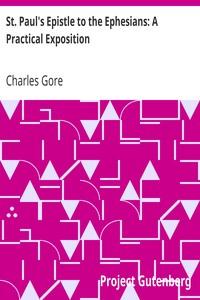Read this ebook for free! No credit card needed, absolutely nothing to pay.
Words: 51172 in 13 pages
This is an ebook sharing website. You can read the uploaded ebooks for free here. No credit cards needed, nothing to pay. If you want to own a digital copy of the ebook, or want to read offline with your favorite ebook-reader, then you can choose to buy and download the ebook.


: St. Paul's Epistle to the Ephesians: A Practical Exposition by Gore Charles - Bible. Ephesians Commentaries
n intruded unjustifiably into St. Paul's thought. It exalts his whole being to consider that he is co-operating with God, and that the conditions under which he lives represent a divine purpose with which he is called to work. It is this which makes him feel it is worth while working: it is this which nerves and sustains him in all sufferings, and enlarges his horizon in all restraints: but he never suggests that it does not lie within the mysterious power of his own will to withdraw himself from co-operation with God. It is at least conceivable to him that he should himself be rejected. In that famous list of external forces which he feels are unable to tear him from the grasp of the divine love, his own will is not included, nor could be included without gross inconsistency.
Beyond all question there is here one problem which remains for all time unsolved and insoluble--the relation of divine fore-knowledge to human freedom. If we men are free to choose, how can it be, or can it really be the case at all, that God knows beforehand actually how each individual will behave in each particular case? This is a problem which we cannot fathom any more than we can fathom any of the problems which require for their solution an experience of what an absolute and eternal consciousness can mean. But the problem belongs to metaphysics. It inheres in the idea of eternity and God. The Bible neither creates it nor solves it. We may say it does not touch it.
Certainly when St. Paul dwells upon the thought of divine predestination he dwells upon it in order to emphasize that, through all the vicissitudes of the world's history, a divine purpose runs; and especially that God works out His universal purposes through specially selected agents 'his elect,' on whom His choice rests for special ends in accordance with an eternal design and intention. And the sense of co-operating with an eternal purpose of God inspires and strengthens him. For God will not drop His work by the way. Whom He did foreknow or mark out beforehand for His divine purposes, them He also foreordained or predestinated to sonship, and in due time called into the number of His elect, and justified them, that is, pardoned their sins and gave them a new standing-ground in Christ, and glorified or will glorify them by the gradual operation of His grace. The steps or moments of the divine action recognized in the Epistle to the Romans are practically the same as those alluded to in the Epistle to the Ephesians. There also is the eternal choice, and the predestination to sonship, and at a particular time the call into the Church, and the justification or remission of sins through the blood of Christ, and the gradual promotion through sanctification to glory. And the moral fruit of contemplating God's eternal purpose for His elect, and the stages of His work upon them, is to be cheerful confidence of a right sort. God will not drop them by the way, nor the work which they are 'called' to accomplish. 'God who hath begun a good work will perfect it until the day of Jesus Christ.' Wherever St. Paul recognizes a movement towards good in the single soul or in the world, he knows that it is no accidental or passing phase: it has its roots in the eternal will, and unless we resist it in wilful obstinacy, the eternal will shall at last carry it on to perfection. 'There shall never be one lost good.'
It is not out of place to notice in this connexion how closely akin is St. Paul's thought to the modern philosophy of evolution. Only to St. Paul the slow process of cosmic or human evolution is in no kind of opposition to the idea of divine design.
This predestinated body, the Church, is what in another word St. Paul calls the 'elect' or 'chosen.' The idea of election has had a very false turn given to it, partly through mistakes which have been already alluded to, partly because the idea of election has been separated from another idea with which in the Bible it is most closely associated, the idea of a universal purpose to which the elect minister. No thought can be more prominent in the Old Testament than the thought that some men out of multitudes have been chosen by God to be in a special relation of intimacy with Him. 'You only have I known, O Israel, of all the families of the earth.' But this election to special knowledge of God, and special spiritual opportunity, carries with it a corresponding responsibility. It is no piece of favouritism on God's part. The greater our opportunity the more is required of us. 'You only have I known of all the families of the earth; therefore will I visit upon you all your iniquities.' The fact is that the principle of inequality in capacity and opportunity runs through the whole world both in individuals and in societies. A great genius or a great nation has special privileges and opportunities, but also, in the sight of God who judges men according to their opportunities, special responsibilities. But also the special vocation of every elect individual or body is for the sake of others. It is God's method to work through the few upon the many. That is the law of ministry which binds all the world of strong and weak, of rich and poor, of learned and ignorant, into one. Thus Abraham had been chosen alone, but it was that, through his seed, all the nations of the earth should be blessed. Israel was exclusively the people of God, but it was in order that all nations should learn from them at last the word of God. The apostles were the first 'elect' in Christ with a little Jewish company. 'We'--so St. Paul speaks of the Jewish Christians--'we who had before hoped in Christ.' But it was to show the way to all the Gentiles who were also to constitute 'God's own possession' and His 'heritage.' The purpose to be realized is a universal one: it is the re-union of man with man, as such, by being all together reunited to God in one body. And this idea is to have application even beyond the bounds of humanity. Unity is the principle of all things as God created the world. 'In Christ,' St. Paul writes to the Colossians, 'all things consist' or 'hold together in one system.' It is only sin, whether in man or in the dimly-known spiritual world which lies beyond, which has spoiled this unity, and in separating the creatures from God has separated them from one another. And the Church of the reconciliation is God's elect body to represent a divine purpose of restoration far wider than itself--extending in fact to all creation. It is the divine purpose, with a view to 'a dispensation of the fulness of the times, to sum up' or 'bring together again in unity' all things in Christ; the things in the heaven, the dim spiritual forces of which we have only glimpses, and the things upon the earth which we know so much better.
This great and rich idea of the election of the Church as a special body to fulfil a universal purpose of recovery, cannot be expressed better than in the very ancient prayer which forms part of the paschal ceremonies of the Latin liturgy. 'O God of unchangeable power and eternal light, look favourably on Thy whole Church, that wonderful and sacred mystery, and by the tranquil operation of Thy perpetual providence, carry out the work of man's salvation; and let the whole world feel and see that things which were cast down are being raised up, and things which had grown old are being made new, and all things are returning to perfection through Him, from whom they took their origin, even through our Lord Jesus Christ.'
This universal reconciliation through a catholic church was God's eternal purpose, but it was kept secret from the ages and the generations, only at last to be disclosed to His apostles and prophets. The word 'mystery' in the New Testament means mostly a divine secret which has now been disclosed. Just as the secret of Nebuchadnezzar's dream, i.e. the purpose of God in the then order of the world, was imparted to Daniel, so now the great disclosure of the divine mystery or secret has been made, primarily indeed to apostles and prophets, but through them to the whole body of the faithful. The faithful must of course begin by receiving that simplest spiritual nourishment which is milk for babes. They are to welcome the divine forgiveness of their sins in Christ, and the gift of new life through Him in their baptism and the laying-on of hands. They are to be taught the rudimentary truths and moral lessons which are the first principles of the oracles of Christ. But they are not to stop with this. They are, and they are all of them without exception, intended to grow up to the full apprehension of the wisdom of the 'perfect' or perfectly initiated. They are to dwell upon the divine secret, now revealed, of God's purpose for the universe through the church till their whole heart and intellect and imagination is enlightened and enriched by it.
And is the greatness of this exaltation and knowledge vouchsafed to the Church to be a renewed occasion of pride--that spiritual pride, the fatal results of which had already become apparent through the rejection of the Jews? No: unless through a complete mistake, the very opposite must be the result. The strength of human pride, as St. Paul had seen long ago, lay in the idea that man could have merit of his own, face to face with God: could have good works which were his own and not God's, and which gave him a claim upon God. That Jewish doctrine of merit had been convicted of utter falsity in St. Paul's own spiritual experience. He had found himself brought to acknowledge, like any sinner of the Gentiles, his simple dependence upon the divine compassion for forgiveness and acceptance. This spiritual experience of St. Paul was only the realizing through one channel of what is, in fact, an elementary truth about human nature. The idea of human independence is demonstrably a false idea. As a matter of fact, man draws his life, physical and spiritual, from sources beyond himself--from the one source, God. In constant dependence on God he lives necessarily from moment to moment, whether to breathe, or think, or will. The freedom of will which he has is not really originative or creative power, but a capacity of voluntary correspondence with what is given him from beyond himself. In that power of correspondence, or refusal to correspond, man's liberty begins and ends. He creates nothing. It is not that man does something and then God does the rest. The truth is that when we track man's good action to its root in his will, we find for certain that God has been beforehand with him. The good he does is in correspondence with moral and physical laws and forces of the universe, or, in other words, with divine powers and purposes lent and suggested to him. To attempt independence of God, to have schemes and plans absolutely one's own, is to work arbitrarily and ignorantly, and ultimately to fail and to know that one has failed. Thus men, when they realize the facts of their condition, must depend, and rejoice to depend, wholly upon God as for forgiveness where they have done wrong, so also for suggestion and power that they may do anything aright. There is then no room for human pride. It is a mistake. We come back to recognize, what St. Paul realized in his own deep spiritual experience and taught the Church at the beginning. Whatever is good in the world is all of divine initiation and of divine grace. It is all, not to our glory, but 'to the praise of his glory,' or 'to the praise of the glory of his grace which he freely bestows on us' out of His pure love and goodwill.
These are the great leading thoughts which are in St. Paul's mind as he begins to write to the Asiatic Christians. His heart, his imagination, his intellect is full of the thought of the catholic society as it exists in Christ, the extension of His life; of this society as the outcome of an eternal and slow-working purpose of God; of this society, as serving universal divine ends for humanity and for the universe; of this society, as affording a sphere in which all men's faculties may be enlightened and delighted with the depth and largeness of the divine purpose; while his whole being is kept, safe from all the delusions of pride, in continual and conscious dependence upon divine grace. With these thoughts reflected in our minds we shall find that we have the main clue to the whole of the Epistle to the Ephesians, and more particularly to all the words of the opening chapter, which St. Paul begins with a great ascription of praise to God for the blessing of the Church.
Rom. viii. 29.
Eph. iv. 15, 16.
Eph. v. 32; Rev. xxi. 9.
Free books android app tbrJar TBR JAR Read Free books online gutenberg
More posts by @FreeBooks

: Is There a Santa Claus? by Riis Jacob A Jacob August - Christmas stories; Santa Claus Juvenile literature Christmas








